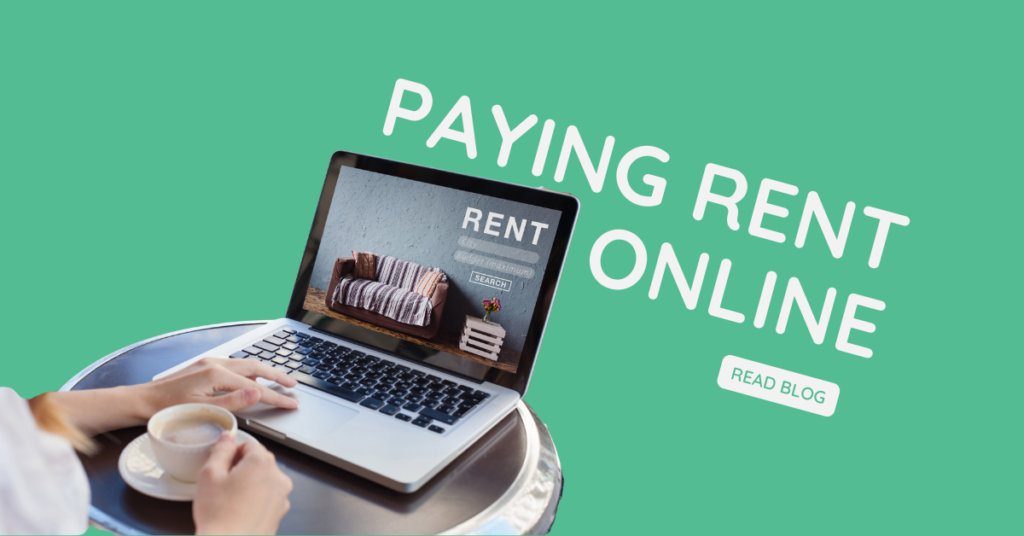A Step-by-Step Guide to Paying Rent Online
Reading Time: 4 minutesPaying rent online has become increasingly popular due to its convenience and security. This guide aims to help renters understand the process and benefits of paying rent online. It provides a comprehensive overview of how to set up and manage online rent payments effectively. This guide is ideal for renters who are new to online…

Paying rent online has become increasingly popular due to its convenience and security. This guide aims to help renters understand the process and benefits of paying rent online. It provides a comprehensive overview of how to set up and manage online rent payments effectively.
This guide is ideal for renters who are new to online payment systems, as well as property managers and landlords who want to streamline their rent collection process.
Table of Contents
Preparing to Pay Rent Online

Ditch the hassle of checks and explore the world of online rent payment! This section will guide you through the process, ensuring a smooth and secure experience.
1. Understanding Online Rent Payment
Online rent payment refers to the process of transferring rent payments electronically. Common methods include bank transfers, credit/debit card payments, and e-wallet transactions. These methods are designed to make paying rent easier and more secure.
2. Gathering Necessary Information
Before you can pay rent online, you need to gather essential details:
- Your landlord or property management company’s payment portal information.
- Your banking or payment details.
- The rent amount and due date.
3. Ensuring Security
To ensure your online rent payment is secure:
- Use a secure internet connection.
- Verify the authenticity of the payment portal.
- Avoid using public Wi-Fi for transactions.
Setting Up Online Rent Payment
Setting up online rent payments is easier than you think! This section explains the steps involved, from creating an account to linking it with your landlord’s system.
1. Creating an Account on the Payment Portal
Follow these steps to sign up for the payment portal:
- Visit the landlord’s specified payment website.
- Click on “Sign Up” or “Create Account.”
- Provide the necessary information such as your name, email, and rental property address.
- Verify your email address if required.
2. Adding Payment Information
Once your account is set up:
- Log in to the payment portal.
- Navigate to the payment information section.
- Enter your bank account or credit/debit card details.
- Set up recurring payments if offered and if you prefer this option for convenience.
3. Linking with the Landlord’s System
To connect your account with your landlord’s system:
- Locate your landlord or property management company within the portal.
- Enter any required identifiers such as your rental unit number or lease ID.
- Confirm the connection.
Making the First Payment

Congratulations on setting up! Now, let’s navigate the portal and make your first payment. This section provides step-by-step instructions to ensure a successful transaction.
1. Navigating the Payment Portal
To make your first payment:
- Log in to the portal and access the dashboard.
- Review the available payment options (e.g., bank transfer, credit card).
- Select the method that suits you best.
2. Inputting Payment Details
When you are ready to pay:
- Enter the exact rent amount due.
- Double-check all payment information for accuracy to avoid errors.
3. Submitting the Payment
To complete the transaction:
- Confirm the payment details.
- Submit the payment.
- Save or print the receipt for your records.
Troubleshooting and Tips
Encountering an obstacle during your online rent payment can be frustrating. However, resolving these issues is often straightforward. This section provides guidance on tackling common problems and offers valuable tips to guarantee a smooth payment process.
1. Addressing Payment Failure
- Verify Network Connectivity: A stable internet connection is crucial for successful online transactions. If your payment fails, confirm a strong and uninterrupted internet connection before proceeding.
- Review Payment Information: Meticulously review all the payment details you entered, including your account number, routing information (for bank transfers), or credit card details. Even a minor typo can cause the transaction to fail.
- Consult Your Financial Institution: If the issue persists after verifying your information, contact your bank or credit card issuer. They can determine if there are any restrictions on your account hindering the payment or identify potential fraud concerns.
- Investigate Portal Outage: Occasionally, payment portals undergo scheduled maintenance, resulting in temporary downtime. Check the portal’s website or contact your landlord to confirm if this might be the cause of the problem. If so, try again later once the maintenance is complete.
2. Best Practices for a Flawless Transaction
- Implement Automated Payment Reminders: Avoid late fees and potential penalties by setting up automated payment reminders through your phone or calendar application. This ensures timely rent payments.
- Maintain Updated Payment Information: Guarantee a smooth transaction by keeping your bank account details or credit card information on the payment portal current. Outdated information can disrupt the payment process.
- Explore Recurring Payments (Optional): Many online rent payment portals offer the option to schedule recurring payments. Consider utilizing this feature for ultimate convenience. This eliminates the need to manually initiate payments each month, ensuring on-time rent delivery.
3. Seek Assistance When Necessary
If you encounter an unresolved issue, don’t hesitate to reach out to the payment portal’s customer service department. Their website or app will likely have a dedicated support section with contact information readily available.
When contacting support, be prepared to provide your account information and details of the payment issue you’re facing. This expedites the troubleshooting process and allows the support representative to assist you swiftly.
Additional Tips
- Bookmark the Payment Portal: For easy access and future reference, bookmark the payment portal’s website or download their app onto your mobile device.
- Review Payment History Regularly: Develop the habit of reviewing your payment history within the portal periodically. This ensures all transactions are accurately reflected and allows for early detection of any discrepancies.
- Maintain Strong Passwords: Implement strong and unique passwords for your online rent payment account. This significantly enhances the security of your financial information.
Conclusion
Online rent payments offer unmatched convenience and security. They simplify the payment process, reduce the risk of lost or delayed payments, and provide a clear payment history. Transitioning to online rent payments can greatly benefit both tenants and landlords by saving time and enhancing security.
Renting out your property shouldn’t be a hassle. Green Ocean Property Management offers comprehensive property management, taking care of everything from maintenance to tenant relations. Let us handle the details, so you can focus on what matters most.
Contact us today and see what expert property management can do for you!
Can tenants paint the wall?
Reading Time: 2 minutes When moving in, one of the most common questions we get is, “Can tenants paint the wall?” As a property management company, this is what we personally do to protect you, the landlord. Any planned painting must be requested We put in all of our leases that if any type of painting…
How to Create a Rental Property Marketing Plan
Reading Time: 4 minutesA successful rental property marketing plan is essential for attracting and retaining high-quality tenants. Without a solid marketing plan, rental properties may sit vacant for extended periods, leading to lost income for property owners. This blog will discuss creating a rental property marketing plan that works. Define Your Target Market The first step…
Sustainability on a Budget: Practical Tips for Eco-Friendly Living
Reading Time: 3 minutesIn today’s world, there’s a growing awareness of the importance of living sustainably. Creating a sustainable home doesn’t have to break the bank. With a little creativity and effort, you can make eco-friendly choices that are both budget-friendly and good for the planet. Here are some practical tips for eco-friendly living and achieving a…








